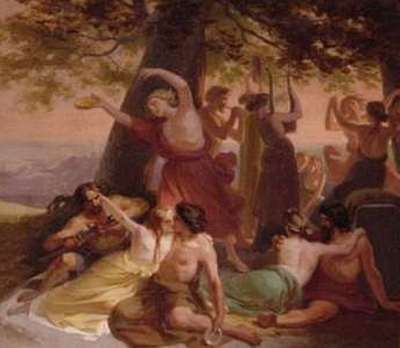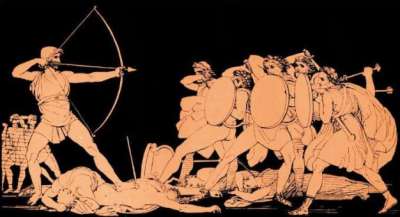
In my last post I have been analysing the revenge perpetrated by Odysseus against Penelope’s suers at his return to Ithaca. He showed no mercy to anyone and savagely slain 108 individuals:
“These men here has the fate of the gods destroyed and their own reckless deeds, for they honoured no one of men upon the earth, were he evil or good, whosoever came among them; wherefore by their wanton folly they brought on themselves a shameful death”.
Yet our hero has not fully performed his offended king’s “duties” as loyalty within the oikos needs now to be assessed and punishment to the unfaithful must be performed; thus more blood and pitiless actions will take place under his orders. Nevertheless a totally different approach will lead him in administering justice within the saddened walls of his own palace.
Twelve of his fifty servants, have shown disrespect to Penelope and Telemachus, and worse of all they have become concubines of the suers, thus violating their oikos duty of sexual fidelity towards their king:
“But come, name thou over to me the women in the halls, which ones dishonour me and which are guiltless.” Then the dear nurse Eurycleia answered him: “Then verily, my child, will I tell thee all the truth. Fifty women servants hast thou in the halls, women that we have taught to do their work, to card the wool and bear the lot of slaves. Of these twelve in all have set their feet in the way of shamelessness, and regard not me nor Penelope herself. And Telemachus is but newly grown to manhood, and his mother would not suffer him to rule over the women servants.”
Odysseus summons the twelve unfaithful women and orders them to move away the slain bodies and clean up the still bleeding hall, floor and furniture; regrettably this is not at all their punishment:
“But when they had set in order all the hall, they led the women forth from the well-built hall to a place between the dome and the goodly fence of the court, and shut them up in a narrow space, whence it was in no wise possible to escape. Then wise Telemachus was the first to speak to the others, saying: “Let it be by no clean death that I take the lives of these women, who on my own head have poured reproaches and on my mother, and were wont to lie with the wooers.”
The disloyal concubines were all hanged to death:
“…tied the cable of a dark-prowed ship to a great pillar and flung it round the dome, stretching it on high that none might reach the ground with her feet. And as when long-winged thrushes or doves fall into a snare that is set in a thicket, as they seek to reach their resting-place, and hateful is the bed that gives them welcome, even so the women held their heads in a row, and round the necks of all nooses were laid, that they might die most piteously. And they writhed a little while with their feet, but not long.”
The maid-servants were not the only people of the oikos who had betrayed and been punished. Melanthius, his goatherd, had been repeatedly helping the suitors, even supplying them with weapons during the feral revenge of Ulysses:
“Then Melanthius, the goatherd, answered him: “It may not be, Agelaus, fostered of Zeus, for terribly near is the fair door of the court, and the mouth of the passage is hard. One man could bar the way for all, so he were valiant. But come, let me bring you from the store-room arms to don, for it is within, methinks, and nowhere else that Odysseus and his glorious son have laid the arms.” So saying, Melanthius, the goatherd, mounted up by the steps of the hall to the store-rooms of Odysseus. Thence he took twelve shields, as many spears, and as many helmets of bronze with thick plumes of horsehair, and went his way, and quickly brought and gave them to the wooers.”
And he was stopped by Eumaeus, the loyal swineherd, who offers to Ulysses to kill him:
“But Melanthius, the goatherd, went again to the store-room to bring beautiful armour; howbeit the goodly swineherd marked him, and straightway said to Odysseus who was near: “Son of Laertes, sprung from Zeus, Odysseus of many devices, yonder again is the pestilent fellow, whom we ourselves suspect, going to the store-room. But do thou tell me truly, shall I slay him, if I prove the better man, or shall I bring him hither to thee, that the fellow may pay for the many crimes that he has planned in thy house?”
Ulysses was still fighting against the suers, therefore it is Eumaeus who is appointed to chase, capture and execute the traitor:
“I and Telemachus will keep the lordly wooers within the hall, how fierce soever they be, but do you two bend behind him his feet and his arms above, and cast him into the store-room, and tie boards behind his back; then make fast to his body a twisted rope, and hoist him up the tall pillar, till you bring him near the roof-beams, that he may keep alive long, and suffer grievous torment.”
Eumaeus, helped by another swineherd, did then perform his duty in full accordance with his master’s instructions and did leave the traitor tied up with a mortal rope:
“then the two sprang upon him and seized him. They dragged him in by the hair, and flung him down on the ground in sore terror, and bound his feet and hands with galling bonds, binding them firmly behind his back, as the son of Laertes bade them, the much enduring, goodly Odysseus; and they made fast to his body a twisted rope, and hoisted him up the tall pillar, till they brought him near the roof-beams.”
It is quite remarkable that the chastisement is in both cases decided by Odysseus, but performed by others. Unlike his “vendetta” – which is carried out personally by Odysseus, when it come to administering justice in his own reign our hero issues his “sentence” and then dispatches servants to summon the culprits and perform the unfaltering punishment.
Furthermore, it is worth noticing that in both cases the tool used for the execution is a “rope” – albeit different kind of chords (a slipknot or tie rope) and used with different method (hanging or fastening). The maid-servants were hanged with a brochos – a noose – which in the Greek world was typical. Women normally chose it (in case of suicide), or were sentenced to death always by hanging. There are numerous examples within the ancient Greek mythology, literature and tragedy that confirm this custom: in a old Rhodian legend reported by Pausania Helen of Troy was hanged as a refugee in Rhodes after Menelaus death in Sparta; Antigone the daughter of the unintentionally incestuous matrimony between King Oedipus of Thebes and his mother Jocasta, took her life by hanging herself in order to prevent her from being buried alive by Creon; and her mother as well, Jocasta who committed suicide once she realised being an incestuous wife:
“And I saw the mother of Oedipodes, fair Epicaste,[Homer version of Jocasta] who wrought a monstrous deed in ignorance of mind, in that she wedded her own son, and he, when he had slain his own father, wedded her, and straightway the gods made these things known among men. Howbeit he abode as lord of the Cadmeans in lovely Thebe, suffering woes through the baneful counsels of the gods, but she went down to the house of Hades, the strong warder. She made fast a noose on high from a lofty beam, overpowered by her sorrow, but for him she left behind woes full many, even all that the Avengers of a mother bring to pass”.
Actually the hanging of a woman was then also considered an aition, a ritual: in Delphi, as Plutarch wrote, every eight years a religious ceremony was performed to commemorate the death of a young girl Charila, who according to the legend had been sacrificed to put an end to a famine in the region; the procession carried a hanged-doll to Charila’s grave; and again Statius in his Thebaid reports of a choir of maidens that, feeling in some kind of danger, decided to escape by hanging themselves:
“cum luderent virgines meditatus ruinam omnis chorus in arborem nucis fugit et in ramo eius pependit”
Another Thessaly ritual, performed on a yearly basis, consisted in several virgins that performed the hanging of a goat. This ritual was linked to the legend of Tartar, a ruthless tyrant of Melitea (a polis of Thessaly) who repeatedly kidnapped and raped young girls from the region, until one of them Aspalis hanged herself to escape his assaults and tortures. Later on her brother, disguised as a maiden, sneaked into the tyrant’s palace and murdered him, thus avenging his sister.
Another rope: this time is the desmos – a strong fastening rope – and another punishment is instead arranged for the male-traitor. Unlike the twelve servants, the disloyal goatherd will face a slow and painful death, tied up to a wooden column – the kion. This punishment, which clearly refers to the myths of Sisyphus, Prometheus, Tantalus, and known as apotympanismos, was normally administered to awful criminals being meant to leave them die gradually; and it was widely diffused even in the Pentecontaetian Athens, with the only difference in later days of exposing the sentenced unlawful villains for the public to see and be intimidated. The punishment of women, instead, was and remained along the centuries after Homer a more homely affair, strictly performed and retained within the walls of the oikos – coherently likewise everything referred to Athenian women…
Thus Ulysses, considering his mythological and traditional background, in addition to his well known skills and endowments, within his kingdom seems also a brainy judge, who – although quite briskly – following the unwritten nomoi and his own popular sense of themis – rather not unwisely – administers the justice in Ithaca and dispenses the consequent canonical punishments to the rogues.
